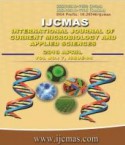


 National Academy of Agricultural Sciences (NAAS)
National Academy of Agricultural Sciences (NAAS)

|
PRINT ISSN : 2319-7692
Online ISSN : 2319-7706 Issues : 12 per year Publisher : Excellent Publishers Email : editorijcmas@gmail.com / submit@ijcmas.com Editor-in-chief: Dr.M.Prakash Index Copernicus ICV 2018: 95.39 NAAS RATING 2020: 5.38 |
Milk protein fibre is made out of skimmed milk. Main components of this fibre are casein proteins, drawn from the cow’s milk. It is responsible for the white, opaque appearance of milk in which it is combined with calcium and phosphorus as clusters of casein molecules, called micelles. This fiber contains eighteen types of amino-acids extracts that helps in the nourishments of the skin and makes it healthier. Milk protein fibre is a blend of nature, science and technology that has benefits of natural as well as synthetic fibre. Milk fiber was invented in 1930s in both Italy and America and was called milk casein. A new generation of innovative fiber and a kind of synthetic fiber made of milk casein through bioengineering method with biological health care function and natural and long-lasting antibacterial effect, which has got valid certification for international ecological textile certification. It is hygienic, flexible, smooth, sheen, renewable, biodegradable and eco – friendly fabric but it has low durability and is expensive. The mass specific resistance of milk protein fiber is large. Milk protein fiber is bulky and it is easy to open. The cohesion force is relatively weaker. Casein fibres resemble wool in having a soft warm handle. Casein fibres provide good thermal insulation. They are resilient like wool. The process of making milk protein fiber include desizing, scouring, bleaching, dyeing, drying, printing, finishing and carbonising. Milk fibers can be blended with many other fibers like cotton, cashmere, silk etc. The healthy nature of milk fiber is considered as a perfect material for manufacturing of underwear's. Milk casein protein is considered as a main ingredient of milk protein fiber, which can lubricate the skin. The milk proteins contain the natural humectants factor which can help to maintain the skin moisture, to reduce the wrinkles and to smoothen the skin. Milk fiber can be used for making of garments, beddings, socks, sportswear’s, new born’s bath towels etc. The milk protein fiber is a healthy and comfortable fiber that makes us feels better and will certainly become popular in the market.
 |
 |
 |
 |
 |